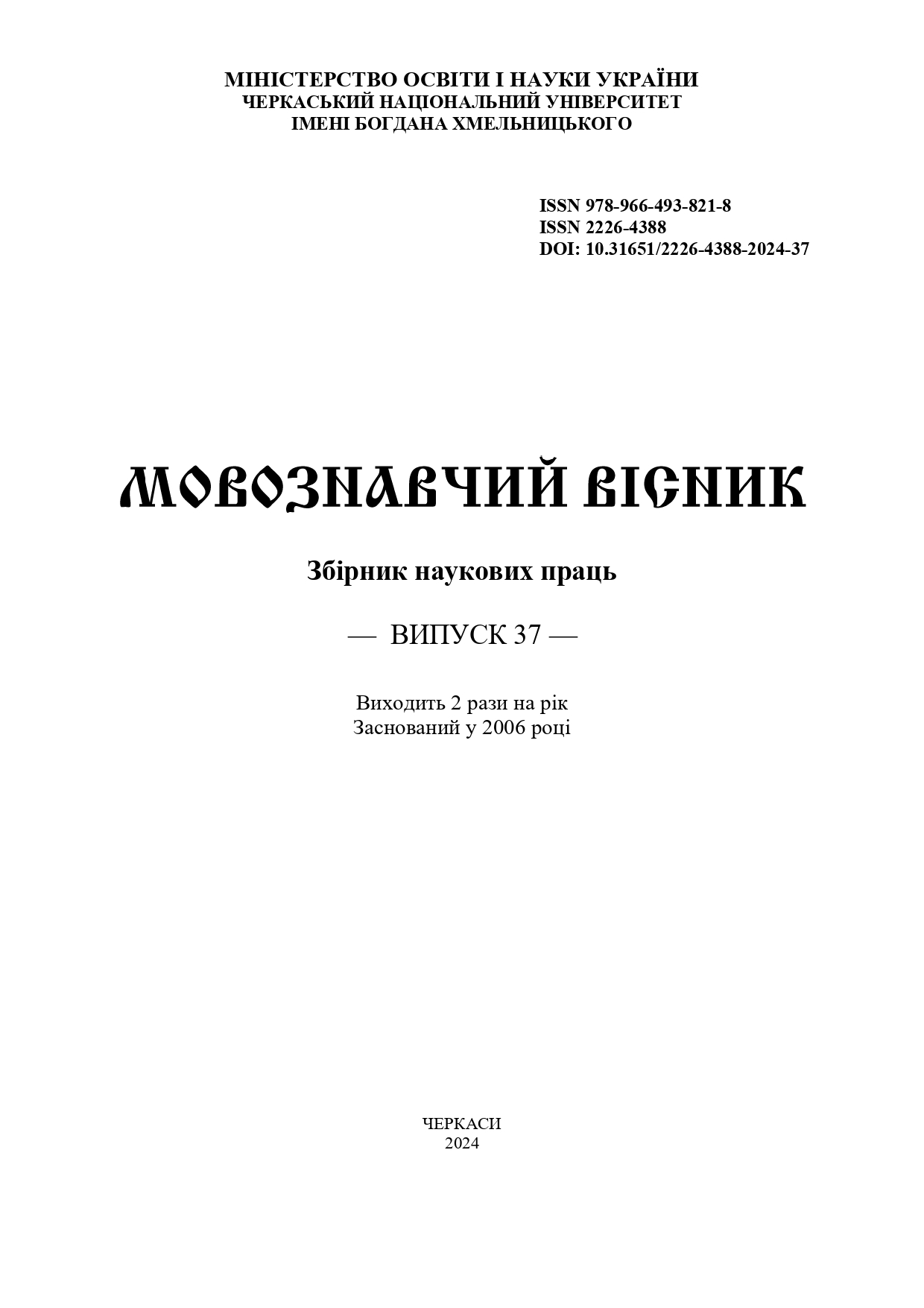ANGLIZATION OF SCIENTIFIC AND EDUCATIONAL NETWORK DISCOURSE: LEXICO-THEMATIC SCOPE AND SOCIAL FACTORS OF THE PHENOMENON
Main Article Content
Abstract
Introduction. Borrowing process happens constantly, reflecting new realities of our life, giving them new names. But no it is possible to allow such processes to take place spontaneously, unmotivated, because it is often attractive a borrowed lexeme is completely unproductive in the system of the modern Ukrainian language.
The purpose of the research is to analyze the provisions of the legislative framework regarding the maintenance of the functions of the English language in Ukraine, to investigate the lexical-semantic basis of network discourse, the functioning of barbarisms and the expediency of their use in the relevant contexts.
Results. Anglicization manifests itself not only in youth slang, in the field of mass culture, alleys in industry terminologies and, which is the latest in the history of the Ukrainian literary language, in official business communication.
The Government of Ukraine promotes the globalization and Europeanization of the scientific and educational environment, motivating it by integration into the world community.
The Ukrainian language is being neutralized and the status of English is being transformed at the legislative level.
Scientific and educational platforms as part of network discourse are affected by Anglicization even under the influence of mediatization of the spheres of science and education. After all, our mass media are full of foreign words, despite the fact that the Ukrainian language is capable of accurately conveying everything that needs its own name by its own means.
Originality. The study of the language of online educational discourse on the subject of anglicisms provides grounds for asserting their unmotivated use. because at a turning point in history it is important to use all the possibilities of the native language.
Conclusions. Despite the popularity and fashion for anlisms, the Ukrainian language has the resources and opportunities to nominate most of the syllogisms. The process of barbarization is unmotivated and dangerous for the Ukrainian language, but it is important to raise the rating and competitiveness of the Ukrainian language in the world.
Article Details
References
Городенська К. Нові явища та процеси в українському словотворенні: динаміка чи деструкція словотвірних норм? Українська мова. 2013. № 2. С. 3–12.
Єрмоленко С. Я. Пуризм. Українська мова: Енциклопедія. Вид. 2-е, випр., доп. Київ : Вид-во «Українська енциклопедія» ім. М. П. Бажана, 2004. 824 с.
Єрмоленко С. Я. Засоби масової комунікації і мовна свідомість сучасного українця. Культура слова. 2013. Вип. 79. С. 123–125.
Єрмоленко С. Я., Бибик С. П., Коць Т. А. та ін. Літературна норма і мовна практика : [монографія]. Ніжин : Аспект-Поліграф, 2013. 320 с.
Клименко Н. Ф., Карпіловська Є. А., Кислюк Л. П. Динамічні процеси в сучасному українському лексиконі : [монографія]. Київ : Видавничий Дім Дмитра Бураго, 2008. 336 с.
Ленець К. В. Варваризм. Українська мова: Енциклопедія. Вид. 2-е, випр., доп. Київ : Вид-во «Українська енциклопедія» ім. М. П. Бажана, 2004. 824 с.
Масенко Л. Т. Мова і суспільство: постколоніальний вимір. Київ : КМ Академія, 2004. 164 с.
Селігей П. Що нам робити із запозиченнями? Українська мова. 2007. № 3. С. 3–31.
Фаріон І., Помилуйко-Недашківська Г., Бордовська А. Англізми та протианглізми: 100 історій слів у соціоконтексті. Львів : Свічадо, 2023. 716 с.
Шестакова С. О. Запозичення як результат міжмовних контактів. Науковий вісник Міжнародного гуманітарного університету. Серія: Філологія. 2018. № 37. Т. 1. С. 87–90.
Список використаних джерел
Всеосвіта. URL: https://vseosvita.ua/ (дата звернення: 28.06.2024).
Закон України «Про вищу освіту». URL: http://surl.li/bvllcl (дата звернення: 25.06.2024).
Закон України «Про забезпечення функціонування української мови як державної». URL: https://zakon.rada.gov.ua/laws/show/2704-19#Text (дата звернення: 25.06.2024).
Закон України «Про застосування англійської мови в Україні». URL:
https://www.rada.gov.ua/news/razom/250307.html (дата звернення: 25.06.2024).
Закон України «Про освіту». URL: http://surl.li/eliojw (дата звернення: 25.06.2024).
Концептуальні засади державної політики щодо розвитку англійської мови у сфері вищої освіти. URL: http://surl.li/upzqlb (дата звернення: 25.06.2024).
Наказ МОНУ від 15.01.2018 № 32 «Про затвердження Порядку формування Переліку наукових фахових видань України». URL: https://zakon.rada.gov.ua/laws/show/z0148-18#Text (дата звернення: 25.06.2024).
Наказ МОНУ від 14.01.2016. № 13 «Про затвердження Порядку присвоєння вчених звань науковим і науково-педагогічним працівникам». URL: https://zakon.rada.gov.ua/laws/show/z0183-16#Text (дата звернення:
06.2024).
Наказ МОНУ від 25.07.2023 № 898 «Методичні рекомендації щодо забезпечення якісного вивчення, викладання та використання англійської мови у закладах вищої освіти України». URL: http://surl.li/rqayhi (дата звернення: 25.06.2024).
На урок. URL: https://naurok.com.ua/ (дата звернення: 28.06.2024).
НУШ. URL: https://nus.org.ua/ (дата звернення: 28.06.2024).
Освіторія. URL: https://osvitoria.media/ (дата звернення: 28.06.2024).

